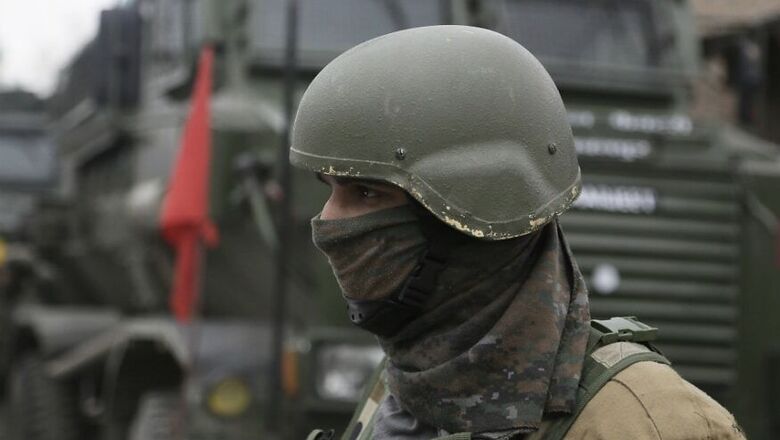
views
After the recent release of the ‘surgical strike’ video, a raging debate has reignited on whether the cross-border strikes of September 2016 achieved any significant strategic purpose, and if in openly acknowledging this, the army has disregarded traditional military practice of keeping such operations covert.
It is argued that neither the Pakistan army nor the terrorists have been deterred by the ‘surgical strike’. Following the strikes, in November 2016, the Nagrota garrison was attacked, infiltration continued and exchanges of gunfire along the Line of Control (LoC) became routine. The goal of surgical strikes, as one expert has pointed out, “seems devoid of any military logic.”
Let me attempt to put this in context - from a purely military perspective and as I saw it. 2016 was a difficult year for the army in Jammu and Kashmir. It started with an attack on the Pathankot airbase and then got progressively worse. In an operation at EDI Pampore in February, we lost five security personnel, including two outstanding young officers of the Special Forces.
In July, after Burhan Wani was gunned down, Kashmir exploded in a volley of protests. Starting from south Kashmir, they soon spread to north Kashmir, which was considered a relatively peaceful area. Even the army hospital at Drugmulla in north Kashmir, which treats almost 10,000 civilians each year, was targeted by stone-pelters. Soldiers were exercising restraint but, being human, their patience was wearing thin.
There was clear evidence of Pakistan’s support to the deteriorating situation in the Valley. Infiltration had been ratcheted up and a vicious social media campaign had been launched from Pakistan. Then came the attack on Uri garrison. Terrorists from across the LoC sneaked in and entered the Uri brigade headquarters, where an infantry unit, on its way to their posts on the LoC, was temporarily housed in tents. By the time the ash of the burnt tents had settled, 18 soldiers had died.
There was an immediate volley of criticism against the army for its inability to protect its camps, for learning no lessons from the past, and for its helplessness in not being able to take the battle to Pakistan. This criticism came not only from veterans and strategic experts but also from our own serving officers and men. And the latter’s views are crucially important because they are the ones fighting our wars on ground and should not lose faith.
At this time, for us in the army, doing nothing was not an option. And we had to do it ourselves and not depend on diplomacy or politics. The feeling was not so much of revenge, but that justice had to be meted out. A murderer is hanged not because all murders will stop but because justice is to be seen to be done. We were not looking at being vindictive but looking for vindication.
We could have killed more Pakistan soldiers and terrorists over a period of time using aerial attacks, artillery fire, snipers and shallow raids. But we decided on the riskier option of sending soldiers into enemy territory because our military pride was at stake.
Some of you sitting outside may now look back and say that we did not see the larger picture. Maybe we were too close to the picture and did not see the edges of the strategic frame, but what we saw was the on-ground feeling of the officers and men. In an army, morale, pride, a sense of self-belief and confidence in the leadership are huge unquantifiable parameters that go into making a strong institution. The euphoria after the ‘surgical strikes’, the squaring of the shoulders, the confidence on the faces of those who returned after launching the strikes, were our vindication.
The army never claimed that the ‘surgical strike’ would force Pakistan to end its support to terror. It would have been professionally foolish to even entertain this idea. The killing of Osama Bin Laden and the numerous drone strikes against the Taliban have not finished off the Al Qaeda or the war in Afghanistan, but that does not mean that the raid at Abbottabad should not have been launched. The fight against terror is a long war and we should not expect quick results.
Should the government have owned up to the strikes? In this case, I think there was no option. Keeping quiet would have not served any purpose. People were getting tired of “appropriate action at time of own choosing”, and there was a sense that the army had become completely defensive. A strong message had to be clearly delivered.
Should the revealing of all such operations become a norm? Obviously, the answer is a ‘No’. There have been a number of covert operations launched in the past, just as there were a number of covert operations launched even after the ‘surgical strikes’. But there is also a time when a nation has to stand up and take responsibility.
Have the ‘surgical strikes’ become over-politicised? Unfortunately, this is true and there has been too much politicking, with the army needlessly dragged into this controversy.
While the timing of the release of the video should be questioned, the position of some others on the other side is equally vacuous. In an op-ed in The Tribune on June 30, a “strategic affairs expert” wrote, “The video clips showed the Army and its leadership in poor light to the discerning observers. The clips showed some terrorists being killed and a few bunkers and military constructions destroyed”.
This is a churlish statement that does no justice to the men who put their lives on line in an extraordinary operation that did the country proud. But again, it reveals that the bringing of the military into the political discourse has the danger of completely vitiating any sensible debate.
(The author is former Northern Commander, Indian Army, under whose leadership India carried out surgical strikes against Pakistan in 2016. Views are personal.)




















Comments
0 comment